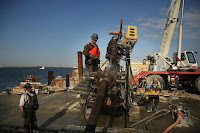“The fundamental problem with environmental justice in the world today is that the people and the places that are most responsible for getting us into this mess seem to be the ones most capable of dealing with the problem.”
So said sociologist Eric Klinenberg earlier this February. A prolific writer and editor, and director of the Institute for Public Knowledge at New York University, Klinenberg had been invited to speak at an event entitled “Disaster and Environmental Justice”, the first of a series of evenings looking at climate change through the lenses of disciplines outside the natural sciences.
“Those who have done so little to drive global warming,” Klinenberg continued, “are about to experience an acute crisis, if they haven’t already.” The idea – that poorer nations will face the worst impacts of changes caused to the climate by the richest nations – is hardly new. But, according to both speakers that evening, it is one of which many in the US still seem unaware.
Environmental injustice
Pulitzer prize-winning author and journalist Elizabeth Kolbert was Klinenberg’s foil that evening, in a discussion about catastrophes and the role they play in galvanizing people to deal with environmental injustice and global inequality.
Kolbert, a Pulitzer prize-winning environmental writer, revealed her chief anxiety: surprisingly, the US’s sheer ability to deal with the direct effects of global warming. A public and political assumption that because America is coping, climate change can’t really be that bad, would allow ignorance of global realities to continue, Kolbert feared. “Is that the messaging that we want? That the US is going to sail through this without any problems?”
...
Low priority for voters
“On the flip side,” Kolbert argued, “you could look at lower Manhattan and see there’s a phenomenal amount of value there. Whereas, if you have to move a low-lying slum in a developing country, you’re not moving all that much by way of infrastructure. So there are ways in which that equity issue can be flipped on its head.” It’s an interesting idea: that poor populations may have the flexibility to relocate more easily than their megacity neighbors – though it opens up even more questions about inequality, migration and the fate of refugees, and none of these have easy answers, especially for a nation that has for so long struggled with the reality of climate change.
“We didn’t expect that this conversation would take place the day after Donald Trump won an election, the Supreme Court blocked Obama’s major clean power bill, and New York City experienced its highest flooding since Sandy,” Klinenberg observed. Trump’s denialism aside, “It’s actually not the case that the majority of Americans doubt that climate change is real. We’ve reached a point where most people do believe that the climate is changing, and they believe for the most part that it’s related to human behavior. The bigger problem seems to be that when you rate climate change against other considerations, it ranks pretty low. Unemployment, access to healthcare, crime, abortion, immigration: all these things are going to take precedence when people go to vote.”
Seeing how relatively little the environment features in the campaign rhetoric of the major presidential candidates this year, it’s hard not to subscribe to Klinenberg’s pessimistic outlook. The American public might finally be waking up to the truth about climate change, but for many, it’s still something that happens in the distant future – or, if it’s here and now, happens only in faraway places, and to other people.
Read more at Why Even Catastrophic Events Can’t Change Attitudes to Climate

No comments:
Post a Comment